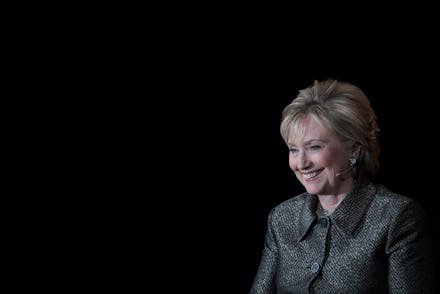Clinton is right to criticize the media. Demands to the contrary show the double standard she faced.

After a few months largely out of the public eye following her defeat in November, Hillary Clinton started speaking about her loss in an interview with New York’s Rebecca Traister and at a talk at Recode's Code Conference.
During her Code Conference talk, Clinton observed that the "scandal" over her use of a private email server "was the biggest nothing burger ever" but the media "covered it like was Pearl Harbor" and suggested that both Russian interference and then-FBI Director James Comey’s last-minute statement about Huma Abedin’s emails found on her husband’s computer helped swing the election.
Predictably, her statements have led to a chorus of pundits arguing that she should just apologize, shut up and go away. But that is both wrong-headed and self-serving: The many flaws of Clinton's candidacy and campaign are largely irrelevant going forward, since she's not going to be the nominee again. But some of the unusual factors that led to Donald Trump's upset victory remain relevant going forward, and Clinton is right to bring attention to them.
In fact, many of the factors that certainly contributed to Clinton's 2016 loss will still be very relevant in 2020. For instance, unless you're certain that either Sens. Elizabeth Warren, Kirsten Gillibrand or Kamala Harris won’t be the Democratic nominee, the sexist double standards that influenced media coverage of Clinton will still be relevant. The potential for interference by the FBI director — who Trump will likely appoint, having fired Comey — and Russia are still there. Voter suppression by Republicans will likely get worse before it gets better. And Donald Trump would love a media that largely ignores Paul Ryan's awful and massively unpopular policy agenda and opts to focus on trivial matters again.
The problem isn't that Clinton is speaking about these critical issues; the problem is that not enough other prominent Democrats are.
Many of the calls for Clinton to "just go away" are based on this idea of a tradition that losing candidates just admit that they were awful and permanently retire from public life. But this "tradition" is entirely imaginary. For example: Bob Dole, John McCain and John Kerry all returned to the Senate; Mitt Romney hardly disappeared; and Al Gore has continued to take an active role in promoting environmental policies.
Even if there was such a tradition, it would be relevant only if the 2016 election was typical — but it was anything but. Clinton has no obligation to be silent, and her interventions should be judged like any other public figure.
What is striking is how many critiques of Clinton's arguments — for example: see this from Vox's Timothy B. Lee — don’t even try to engage with her claims on the merits. Lee, for example, doesn’t deny that the hacks of the DNC, DCCC and John Podesta’s inbox were damaging to her campaign, or that sexism played a role in negative coverage of Clinton; he just implies that Clinton should decline to discuss them.
Lee's argument isn't that Clinton is wrong on the merits — it’s that it's inherently wrong for her to say that any factors but her own mistakes influenced the outcome of the election. But this is silly. As long as what she's saying is true, there’s nothing wrong with it.
I suspect that one reason so many pundits want Clinton to shut up and go away is that she's willing to call them out on their own misconduct. Pundits don't want Clinton to say these things because she's wrong, but rather because she's unquestionably right.
Clinton's use of a private server was indeed a trivial pseudo-scandal that involved no substantial misconduct — let alone illegality — on Clinton's part, but it got more coverage on broadcast news than all substantive policy issues put together. Mainstream outlets largely failed to inform the public about many literally life-or-death issues — including health care and climate change — to focus on a trivial issue nobody even pretends to care about if it doesn’t involve Hillary Clinton.
It's true that Clinton has an interest in focusing on factors other than her mistakes, and her comments should be taken with a some skepticism (although on both Comey and the media, she's on very solid ground). But of course, this cuts both ways. When CNN's Chris Cillizza — who chose to write more than 50 stories about Clinton's email server before the first Democratic debate — attacks Clinton for not taking sole responsibility for her loss, he's also saying that his decision to focus on inane trivia about Clinton, rather than informing his readers about something important, should not be scrutinized.
The media's refusal to take accountability for its abysmal coverage, and the role it played in putting Trump in the White House, is wrong, and Clinton is right to point this out.